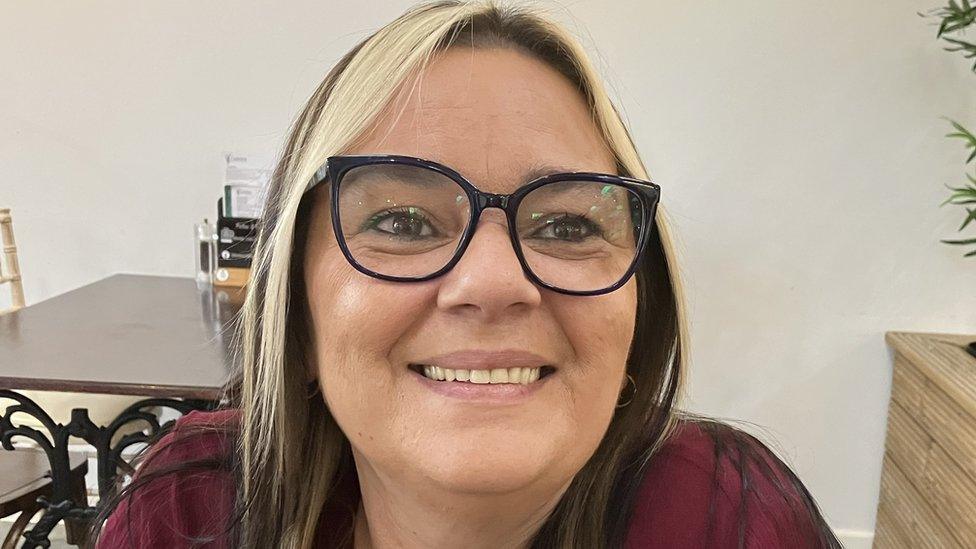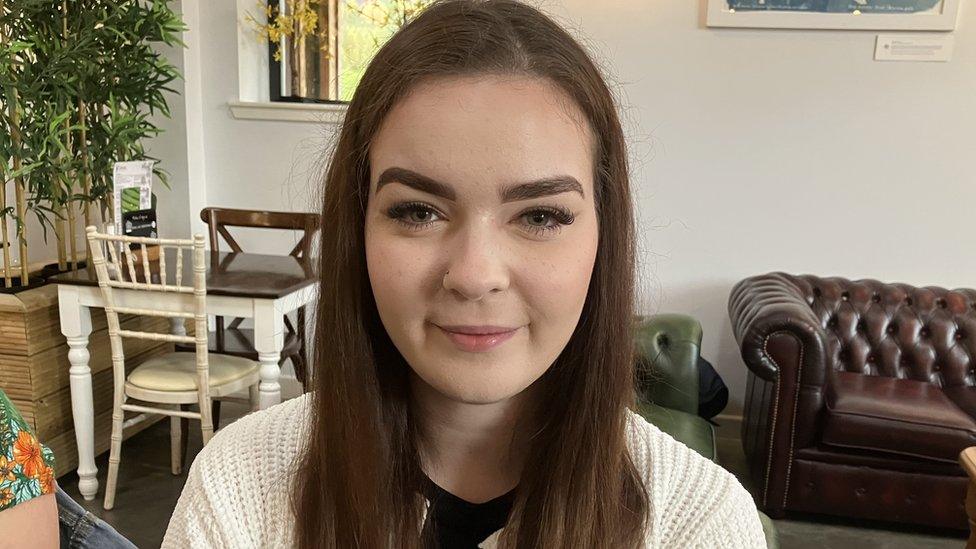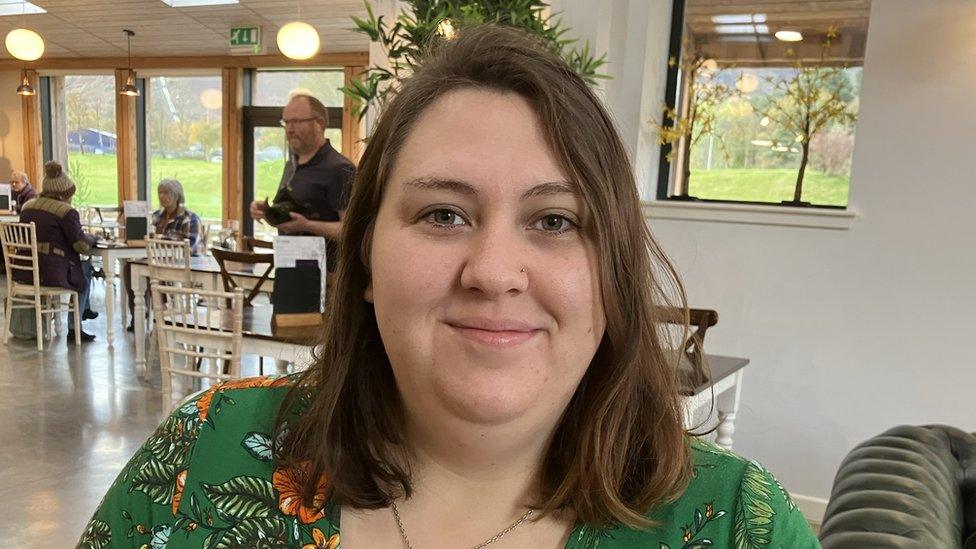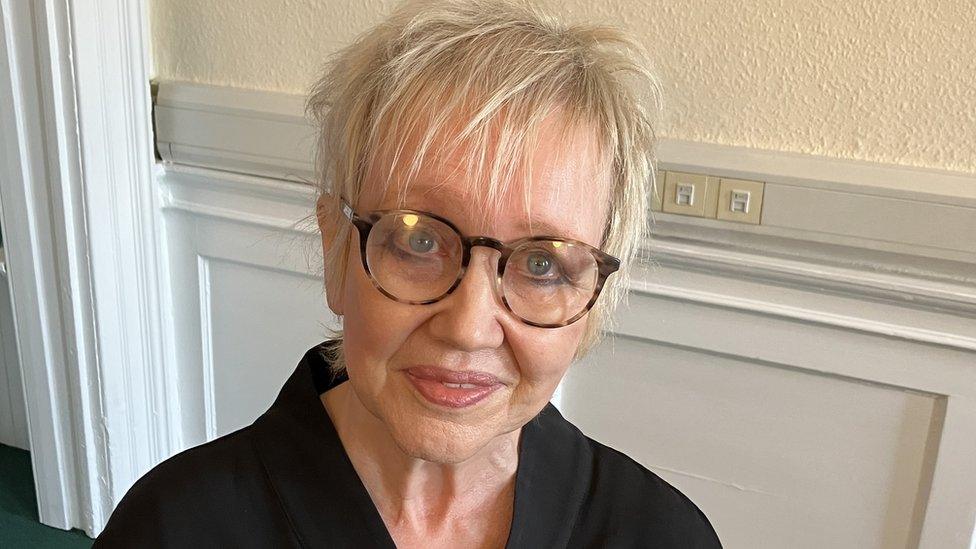We waited three years to see a psychiatrist
- Published

Nessie waited for an appointment for three years
Nessie Simpson waited three years for an appointment with a psychiatrist but when it finally arrived it was 65 miles away from her home in Fort William.
"That's not ideal for someone who is anxious in the first place," she said.
Nessie has a range of mental health conditions including anxiety and bipolar disorder.
She said her mental health "got very bad" during the wait and sometimes she could not get out of bed or perform basic daily tasks.
Her niece Hayley McNamara, who also lives in Fort William, has also just got an appointment after more than three years.

Hayley McNamara said it was very difficult waiting for these appointments
"It was very difficult waiting for these appointments," she told BBC Scotland.
"I'm so thankful that I've had my family and friends with me, because I don't think I would have been here without them."
Fort William is in the NHS Highland area which has a particular problem with its mental health teams being unable to serve huge rural areas.
More than half of people seeking psychological therapy in the Highland health board area face waits of more than a year.
This compares to a Scotland average of 15%.
New research from the Royal College of Psychiatrists in Scotland (RCPS) found there is only one consultant psychiatrist for every 10,250 people across Scotland.
Psychiatrists said the shortage could lead to "painfully long waits" for treatment.

Nicole Buchanan opted to go private to get the help she urgently needed
In order to avoid the long waits faced by her friends, Nicole Buchanan opted to go private to get the help she urgently needed.
Her psychiatrist is also more than 60 miles away in Inverness but they speak on a weekly Zoom meeting.
"So for me I have to outsource away from Fort William to be able to get the help that I need, which not everyone can afford to do," she told BBC Scotland.
Nicole, Nessie and Hayley have all lost loved ones to suicide, and believe the area suffers disproportionately for a number of complex reasons.
"I think because of where we live, it's so rural, there's not much around us, there's not much to do here," Nicole said.
"There's not much for those who don't like the outdoors to do here, without having to travel places and spend an absolute fortune."
'Here's some medication'
Fort William is billed as the outdoor capital of the UK and attracts thousands of tourists each year but the picture can be bleaker for locals.
Hayley said: "Even our clothing shops, we used to have a place that sold dresses and jeans and stuff like that, but everything has closed and they've changed it to mountain clothing."
Another big problem is drug abuse, according to Hayley.
"Everyone just goes to drugs instead," she said.
For Nessie, it is not that officials are not paying attention but rather "they don't have the resources or staff" to handle demand.
Hayley said services had become so stretched that when help was finally offered, it was not always appropriate.
"When you do finally speak to someone, I don't know if it's because I've had bad experiences but I've not been given the help I've needed," she said.
"It's kind of just like, 'here's some medication and we'll come and speak to you in six months'. You don't really get therapy here."

Dr Jane Morris said the situation in rural areas was at a "crisis point"
Dr Jane Morris, who is vice-chair of the Royal College of Psychiatrists in Scotland, said the situation in rural areas was at a "crisis point".
"We are very concerned about our rural populations' mental health," she told BBC Scotland.
"In the culture of rural areas, people have always been very stoical and some of them are quite reluctant to consider that they might have a mental condition that requires support."
She said that when people did try to access support there were significant "workforce problems".
"Particularly coming out of Covid, we've got smaller and smaller mental health teams serving huge areas of the country," she said.
"Although perhaps only a third of Scots live in rural areas, they're spread out over far more than 50% of the land mass.
"That means everyone will have a long way to go to meet with a mental health team, and when it comes to the specialist psychiatric services, they will be even further away."
'Spectrum of solutions'
Dr Morris said this required a "spectrum of solutions" and that one big asset would be rolling out distance mental health treatment over the internet, such as Zoom meetings.
But for those who have to come into hospital or be seen face-to-face hundreds of miles from home, she said transport paid up-front and visiting by families was paramount.
A spokesperson for NHS Highland said its mental health services had longer waiting times than it would like for some time.
Even before the Covid pandemic it recognised that investment was needed to ensure it had the workforce to meet demand.
"We have seen a significant increase in need for assessment and support during the pandemic and this has further added to the waiting times that some people are experiencing," the spokesperson said.
"We are aware of the pressures and distress long waiting times are causing the people who are waiting, and their families, and we apologise for this.
"We are working hard to improve access as quickly as possible."
They added that the health board expected to see waiting times reduce over the coming months following resources from the Scottish government.